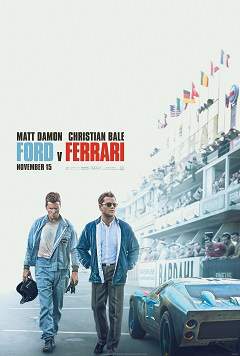 Released – November 22nd, 2019
Released – November 22nd, 2019
Written By – Jez Butterworth, John-Henry Butterworth, Jason Keller
Directed By – James Mangold
Starring – Matt Damon, Christian Bale, Jon Bernthal, Caitriona Balfe, Tracy Letts
Runtime – 119 minutes
Genre – Sports / Drama
“They don’t make ‘em like that anymore.”
Sure, it’s an incredibly clichéd expression, oftentimes utilized by grumpy older people whose best days are long in the rear-view mirror.
But you know what this turn-of-phrase also is? An apt description of Ford v Ferrari, the most recent entry in the filmography of Oscar-nominated filmmaker James Mangold.
And my-oh-my is it a sight to behold.
Ford v Ferrari follows famed automotive designer Carroll Shelby and driver Ken Miles as they attempt to construct a race car for Ford Motors in 1966 capable of defeating Ferrari at the legendary 24 Hours of Le Mans in France. A David vs. Goliath story of truly gargantuan proportions—Ferrari was the juggernaut of the racing world, winning every single 24 Hours of Le Mans from 1960-1965—Shelby and Miles must work together against all conceivable odds in order to cement Ford’s place in the automotive history books, as well as the world at large.
Shelby and Miles are immaculately portrayed by Matt Damon and Christian Bale respectively, and quite honestly, you could write an entire review just about their performances alone. Both are deserving of awards recognition and make compelling cases for Oscar nominations.
For our purposes, however, we’re going to look at Ford v Ferrari on a more macro, filmmaking-centric level—specifically, how it serves as a shining-star example that it is indeed possible to create innovative works within the studio system, a body so often criticized for producing works lacking in that very thing.
It’s a repeated cry from those within the industry—it’s impossible to make an intelligent, original,“adult” film in the studio system; all they want to make are comic book movies, action tentpoles, and IP-driven material. And to a certain extent, that’s true. It’s hard to get a green-light from a major studio on a film deemed a “risk,” or something that isn’t pretty much guaranteed to make a boatload of cash like The Avengers or Star Wars.
But herein lies the paradox of that type of thinking: on paper, Ford v Ferrari is everything that a major studio supposedly hates and shies away from. It’s period. It’s dialogue-heavy. It’s a classic, out-and-out, character-driven drama, with no genre bent or twist. Just based off those aspects alone, it should have been dead-on-arrival, right?
And yet 20th Century Fox produced it for a budget of $97.6 million, and it had one of the best box office opening weekends of the year.
So, how did James Mangold manage to do this? How did he pull off the miraculous feat of trojan-horsing a film like this through the studio system?
He wasn’t afraid to make it an event film.
Similar to what Christopher Nolan did with Dunkirk, Mangold made Ford v Ferrari into a piece of cinema that demands to be seen on the biggest screen you can find with the loudest speakers possible. Especially in an IMAX theater, Ford v Ferrari is enthralling, pulse-pounding, and utterly immersive. You feel like you yourself are in the driver’s seat of the rubber-burning vehicles built by Carroll and Ken. Every bump in the road, every leaning, bending turn, every revving acceleration completely courses through your veins, pumping adrenaline into every fiber of your being throughout the entirety of the film. And the back end of the movie, where we’re in the 24 Hours of Le Monde race? Fuggedaboutit.
Look, whether we like it or not, in the day and age of home theaters and streaming platforms like Netflix, Hulu, and Amazon, in order to convince people to leave the comfort of their own residences and pay top dollar for tickets, it has to be something they can’t provide themselves: a premium-level experience. And Ford v Ferrari absolutely nails that with the same expert precision Ken Miles shows behind the wheel of a Ford GT40.
Now, obviously, Ford v Ferrari’s massive success isn’t only due to this fact. Once you have butts in the seats, you still have to deliver a satisfying film that stands on its own without all the aforementioned bells and whistles. And in this capacity, Ford v Ferrari delivers in every way—it’s emotionally resonant and features an absolutely beautiful central friendship, tight plotting, wonderful moments of levity, and tender explorations of the nuances of the human condition.
All in all, James Mangold has created something truly outstanding here, a film that has the scale and scope of a blockbuster, but also possesses the heart and soul of a more independently-minded one. And for successfully navigating that high-wire act where so many others have failed, Mangold will undoubtedly draw the ire and jealously of fellow filmmakers, while also reaping the critical and commercial plaudits he so totally deserves.
